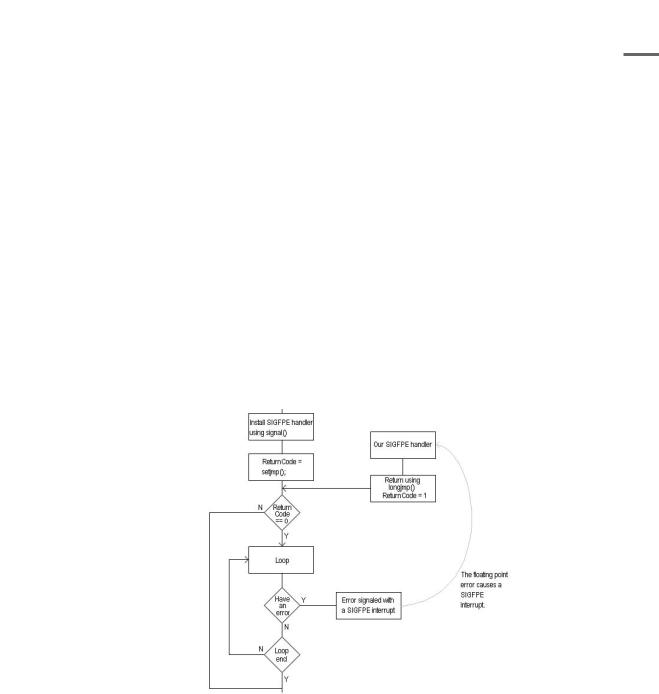Part IV • Documenting the Differences
gets()
Header: |
stdio.h |
Syntax: |
char * gets(char * szBuffer); |
Description: |
Gets the next line from stdin, until either the end of the stdin file |
|
is reached or until a newline character is encountered. |
Parameters: |
szBuffer—Pointer to a character string to hold the characters |
|
read. |
Returns: |
Pointer to szBuffer or NULL if an end of file condition is encoun- |
|
tered. |
Example: |
char szBuffer[100]; |
|
gets(szBuffer); |
Note: |
Careful: There is no check for buffer overrun! It may be better to |
|
use fgets() rather than this function. |
gmtime()
Header: |
time.h |
|
Syntax: |
struct tm * gmtime(const time_t * |
|
|
TimeValue); |
Description: |
Breaks down TimeValue and places the result into the tm structure. |
Parameters: |
TimeValue—Pointer to a time_t variable. |
Returns: |
A returned pointer to a structure of type tm. |
Example: |
tm |
TimeStruct; |
|
time_t |
OurTime; |
|
OurTime = time(NULL); |
|
TimeStruct = (tm*)gmtime(&OurTime); |
Note: |
Remember to consider the effects of different time zones and |
|
daylight savings time. |
Part IV • Documenting the Differences
Parameters: |
Character—The character to be tested. |
Returns: |
A non-zero if the character is a control character or a zero if it is |
|
not. |
Example: |
if (iscntrl(‘\a’)) |
|
printf(“‘\a’ is a control character” |
|
“ (the bell?) \n”); |
Note: |
See isalpha(). |
isdigit()
Header: |
ctype.h |
Syntax: |
int isdigit(int Character); |
Description: |
Tests to see if the specified character is a numeric digit (0–9). |
Parameters: |
Character—The character to be tested. |
Returns: |
A non-zero if the character is a numeric digit or a zero if it is not. |
Example: |
if (isdigit(‘1’)) |
|
printf(“‘1’ is a digit \n”); |
Note: |
See isalnum(). |
isgraph()
Header: |
ctype.h |
Syntax: |
int isgraph(int Character); |
Description: |
Tests to see if the specified character is a printable character |
|
(except a space). |
Parameters: |
Character—The character to be tested. |
Returns: |
A non-zero if the character is printable, or a zero if it is not. |
Example: |
if (isgraph(chChar)) |
|
putc(chChar); |
Note: |
To test for a blank character, use isspace(). |
Part IV • Documenting the Differences
Parameters: |
Character—The character to be tested. |
Returns: |
A non-zero if the character is punctuation or a zero if it is not. |
Example: |
if (ispunct(chChar)) |
|
putc(chChar); |
Note: |
None. |
isspace()
Header: |
ctype.h |
Syntax: |
int isspace(int Character); |
Description: |
Tests to see if the specified character is a valid whitespace |
|
character. |
Parameters: |
Character—The character to be tested. |
Returns: |
A non-zero if the character is a valid whitespace character or a zero |
|
if it is not. |
Example: |
|
|
if (isspace(chChar)) |
|
putc(chChar); |
Note: |
To test for a non-blank character, use isgraph(). Valid whitespace |
|
characters include those shown in Table 14.3: |
Table 14.3. Valid whitespace characters. |
|
|
Character |
Description (hex value) |
|
|
‘ ‘
‘\f’
‘\n’
‘\r
‘\t
‘\v
The space character.
The form feed character (\x0C’). The newline character (\x0A’).
The carriage return character (\x0D’). The tab character (\x09’).
The vertical tab character (\x0B’).
|
ANSI C’s Library Functions |
C C C |
|
|
14C |
|
|
C C C |
isupper() |
|
C C |
|
|
Header: |
ctype.h |
|
Syntax: |
int isupper(int Character); |
|
Description: |
Tests to see if the specified character is uppercase (A–Z). |
|
Parameters: |
Character—The character to be tested. |
|
Returns: |
A non-zero if the character is uppercase or a zero if it is not. |
Example: |
if (isupper(chChar)) |
|
|
putc(chChar); |
|
Note: |
To test for a lowercase character, use islower(). |
|
isxdigit() |
|
|
Header: |
ctype.h |
|
Syntax: |
int isxdigit(int Character); |
|
Description: |
Tests to see if the specified character is a valid hexadecimal digit |
|
character (a–f, A–F, and 0–9). |
|
Parameters: |
Character—The character to be tested. |
|
Returns: |
A non-zero if the character is a valid hexadecimal digit or a zero if |
|
it is not. |
|
Example: |
|
|
|
if (isxdigit(chChar)) |
|
|
putc(chChar); |
|
Note: |
To test for a decimal-only digit, use isdigit(). |
|
labs()
Header: |
math.h & stdlib.h |
Syntax: long labs(long lValue);
Description: Returns the absolute value of lValue.
Part IV • Documenting the Differences
Parameters: |
lValue—The value for which absolute value is desired. |
Returns: |
Absolute value of lValue. |
Example: |
|
|
long lReturned; |
|
lReturned = labs(-234556); |
Note: |
Also see abs(). |
ldexp()
Header: |
math.h |
Syntax: |
double ldexp(double lValue, int nPower); |
Description: |
Multiplies a floating point value by two raised to nPower(lValue |
|
* 2nPower). |
Parameters: |
lValue—Value to multiply. |
|
nPower—Power to raise two by. |
Returns: |
(lValue * (2 * nPower)) |
Example: |
|
|
if (ldexp(.785398, 2) == 3.14259) |
|
printf(“It works!\n”); |
Note: |
See frexp(). |
ldiv()
Header: |
stdlib.h |
Syntax: |
ldiv_t ldiv(long numerator, long |
|
denominator); |
Description: |
Returns both the quotient and remainder from the division of |
|
numerator by denominator. |
Parameters: |
numerator—Long integer value to be divided. |
|
denominator—Long integer value to divide by. |
|
|
ANSI C’s Library Functions |
C C C |
|
|
|
14C |
|
|
|
C C C |
Returns: |
Structure ldiv_t containing the result of the division. |
C C |
|
Example: |
ldiv_t |
DivResult; |
|
|
DivResult = ldiv(100, 3); |
|
Note: |
Also see div(). |
|
localeconv() |
|
|
|
Header: |
locale.h |
|
Syntax: |
struct lconv * localeconv(void); |
|
Description: |
Returns the structure type lconv filled in with appropriate values |
|
for the location. |
|
Parameters: |
None. |
|
|
Returns: |
Pointer to an lconv structure. |
|
Example: |
lconv |
OurConversions; |
|
|
OurConversions = (lconv *)localeconv(); |
|
Note: |
See setlocale() for more information. |
|
localtime() |
|
|
|
Header: |
time.h |
|
|
Syntax: |
struct tm * localtime(const time_t * |
|
|
|
TimeValue); |
|
Description: |
Breaks down TimeValue, and places the result into the tm |
|
structure. |
|
Parameters: |
TimeValue—Pointer to a time_t variable. |
|
Returns: |
A pointer to a returned structure of type tm. |
|
Example: |
tm |
TimeStruct; |
|
|
time_t |
OurTime; |
|
OurTime = time(NULL);
TimeStruct = (tm *)localtime(&OurTime);
Part IV • Documenting the Differences
Note: Remember to consider the effects of different time zones and daylight savings time.
log()
Header: |
math.h |
Syntax: |
double log(double dValue); |
Description: |
Computes the natural logarithm (base e) of dValue. |
Parameters: |
dValue—Value to compute the natural logarithm of. |
Returns: |
Logarithm of dValue. |
Example: |
printf(“Log of 3.14159 is %f”, |
|
log(3.14159)); |
|
/* Log of 3.14159 is 1.144729 */ |
Note: |
See log10(). |
log10()
Header: |
math.h |
Syntax: |
double log10(double dValue); |
Description: |
Computes the logarithm (base 10) of dValue. |
Parameters: |
dValue—Value to compute the logarithm of. |
Returns: |
Logarithm of dValue. |
Example: |
printf(“Log10 of 3.14159 is %f”, |
|
log10(3.14159)); |
|
/* Log10 of 3.14159 is 0.49715 */ |
Note: |
See log(). |
longjmp()
Header: setjmp.h
|
ANSI C’s Library Functions |
C C C |
|
|
14C |
|
|
C C C |
Syntax: |
void longjmp(jmp_buf jumpbuffer, int |
C C |
|
|
nReturnCode); |
|
Description: |
Restores the environment to what was saved in jumpbuffer by |
|
setjmp(), which causes execution to continue from the call to |
|
setjmp(), with setjmp() returning nReturnCode. |
|
Parameters: |
jumpbuffer—Buffer of type jmp_buf initialized by setjmp(). |
|
nReturnCode—Value that setjmp() returns when longjmp() is |
|
called. |
|
Returns: |
longjmp() does not return, execution continues with setjmp(). |
Example: |
See Figure 14.1 for an example. |
|
Note: |
See setjmp(). |
|
As Figure 14.1 shows, the error handler usually uses longjmp() to get past a part of the program that is causing an error. Since this error handler doesn’t have any access to the failing function’s variables, it cannot make any changes or set any flags.
Figure 14.1. Program flow using setjmp() and longjmp().











